Condemning the captivity of female fighters from the Sheikh Maqsoud and Ashrafieh Protection Forces, YPJ called on young women to join their ranks and take their place on the frontlines of defense: “Only in this way can we protect our land and dignity."
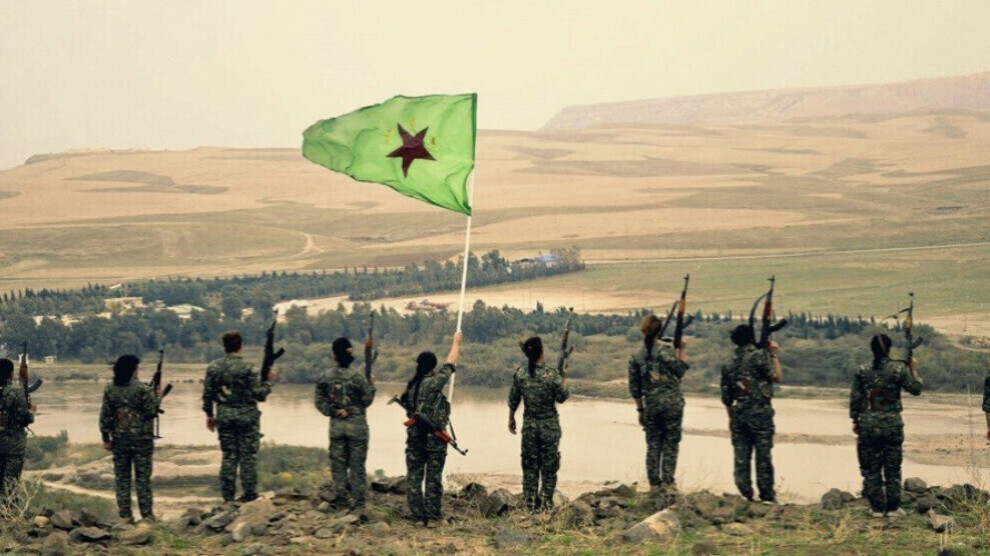
ANF
NEWS DESK
Monday, 2 December 2024,
During their attacks on North-East Syrian region, the jihadist alliance ‘Syrian National Army’ (SNA) took people from the Kurdish neighborhoods of Aleppo hostage and deported them to the Turkish occupation zone. It is still unclear how many hostages are currently in the hands of terrorists. Women who are members of the Hêzên Parastina Civakî (HPC) and are involved in civil resistance in Sheikh Maksud and Ashrafia are among the victims of kidnapping.
The General Command of the Women’s Protection Units (YPJ) released a statement calling for action to expose the brutality of the Turkish occupation state and its mercenaries on a global scale, revealing the extent of their terrorism and holding Erdoğan and the Turkish occupation state accountable for this war and the atrocities committed against the captured young women.
The YPJ statement calling on international women's and human rights organisations to stand up for the hostages includes the following:.
“Over the past several days, our region, along with all of the Syrian territory, has been subjected to a large-scale attack from multiple fronts. It began in Aleppo, where the Syrian people were left face to face with horrific massacres. Simultaneously, these attacks targeted our areas in North and East Syria, where we have demonstrated relentless resistance against these extensive assaults, particularly in the regions of Shehba and Aleppo. Our people, led by women, have shown great resilience in the face of these attacks.
Our people in Sheikh Maqsoud and Ashrafieh, who have gained extensive experience in resistance and warfare over the years, have once again organized themselves against these assaults. Operating under the name of the Sheikh Maqsoud and Ashrafieh Protection Forces, they have thwarted dozens of attacks by mercenaries of the Turkish occupation state.
Undoubtedly, the war continues on multiple fronts. Unfortunately, several young men and women of the Sheikh Maqsoud and Ashrafieh Liberation Forces have fallen captive to these mercenaries. These barbaric mercenaries, who have no regard for the ethics or laws of war, have heinously violated the dignity of the women prisoners, using them as tools for propaganda on their media outlets. They have shamelessly declared to the captive women that they would once again sell them in slave markets. Such actions are utterly inhumane and must not be tolerated.
As the Women’s Protection Units (YPJ), we strongly condemn the brutal acts of the Turkish occupation mercenaries against the captured women and pledge that we will avenge them. We call upon international organizations, particularly Amnesty International and the International Committee of the Red Cross (ICRC), as well as all women’s and human rights organizations, to fulfill their duties in protecting these women who defended their neighborhoods and cities. We insist on the necessity of safeguarding their rights as prisoners of war.
The atrocities committed today by the Turkish occupation mercenaries against the captured young women mirror those carried out by the terrorist organization “ISIS” in 2014 in Sinjar, Mosul, and Raqqa, where thousands of women were sold in slave markets. These actions represent the patriarchal mindset that reached its peak with “ISIS” and Erdoğan’s mercenaries. They are well aware that Kurdish women have written heroic epics against their barbaric practices, resisting to the very end. This is why their inhumane practices have escalated to the level of outright hostility against women.
We direct our call to women’s rights organizations, civil society organizations, prominent figures, freedom advocates, and democrats to protect the captive women. It is imperative to expose the brutality of the Turkish occupation state and its mercenaries on a global scale, revealing the extent of their terrorism and holding Erdoğan and the Turkish occupation state accountable for this war and the atrocities committed against the captured young women.
As the Women’s Protection Units (YPJ), we once again condemn the captivity of the female fighters from the Sheikh Maqsoud and Ashrafieh Protection Forces. We affirm that we will hold the Turkish occupation state and its mercenaries accountable on the frontlines of resistance. In this context, during these historic days marked by extensive attacks on our regions and Syria as a whole, we declare that we stand on the frontlines to protect all women and our people. We also call upon all young women, wherever they may be, to join the ranks of the Women’s Protection Units (YPJ) and take their place on the frontlines of defense. Only in this way can we protect our land and dignity.”
YPJ Forum on Women and Protection: We shall transform every day into a day of resistance
Women's movements and organisations participating in the Second Forum on Women and Protection in the Middle East reiterated their commitment to continue and strengthen the struggle in the region.
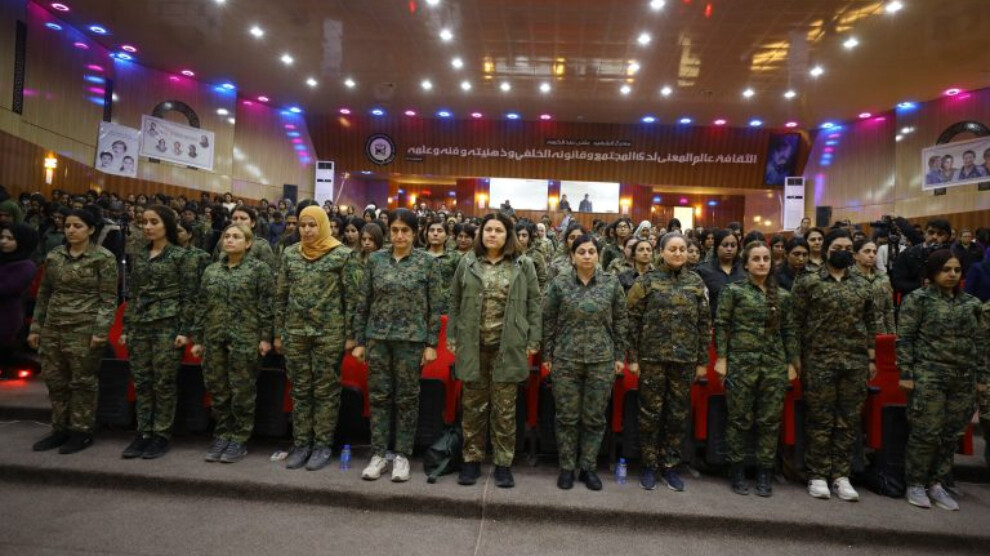
ANF
TABQA
Tuesday, 26 November 2024
The Women’s Protection Units (YPJ) held the Second Forum on Women and Protection in the Middle East under the slogan “An Organized Woman is a Strong Woman, and a Strong Woman is the Foundation of Self-Protection.”
The forum was held in Tabqa on Monday with the participation of 500 delegates, including women's organisations, YPJ fighters and military council members.
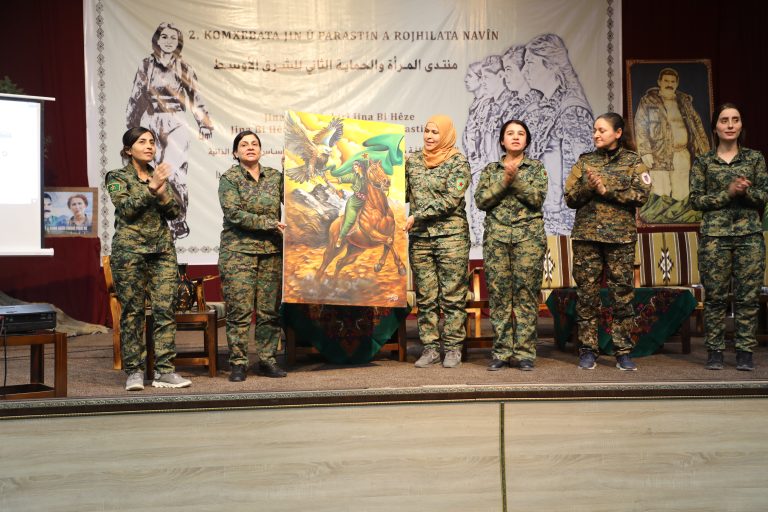
The forum at Tabqa Culture and Art Centre started with a moment of silence, followed by a speech by the YPJ General Commander, Sozdar Dêrik, who said, “We will not let any obstacle affect our struggle. This struggle will lead us to victory.”
Sozdar Dêrik drew attention to the importance of women's emancipation and strengthening their self-defence and said, ‘We need to liberate all women so that they can get their rights, be strong and protected. This has been our primary goal from the beginning.”
Dêrik noted that the wars in the Middle East serve the interests of the powers, not the peoples. Describing the conflicts in many countries such as Lebanon, Syria, Palestine and Yemen as ‘wars of genocide’, Sozdar Dêrik emphasised that women's struggle plays a key role in overcoming the destruction caused by these wars.
Stating that the slogan ‘Jin, Jiyan, Azadî’ (Woman, Life, Freedom) has become a philosophy of freedom for women's movements around the world, Sozdar Dêrik noted that this slogan has been banned in Amed tr: Diyarbakır) in Northern Kurdistan and said that the occupying policies in Turkey aim to suppress the women's struggle.
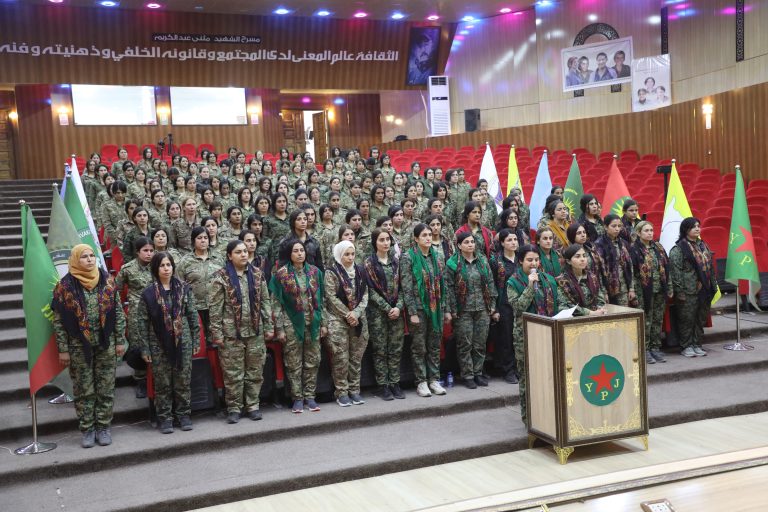
The forum also discussed Kurdish leader Abdullah Öcalan’s evaluations of the role of women in the democratic transformation of the Middle East, which highlighted the historical importance of women in the struggle for social freedom.
A video message sent by the Party of Free Women in Kurdistan (PAJK) and a cinevision show on women's struggle in Northern and Eastern Syria were also screened.

The forum discussed in detail the protection of women, the strengthening of the culture of self-defence and the leading role of women in the construction of a democratic and ecological society. The forum also discussed efforts to develop strategies to build regional defence mechanisms with the goal of providing a safe and sustainable environment for women.
Following the discussions, the forum ended with the reading of messages, theatre performances and songs. Women's movements and organisations participating in the forum reiterated their commitment to continue and strengthen the struggle in the region.
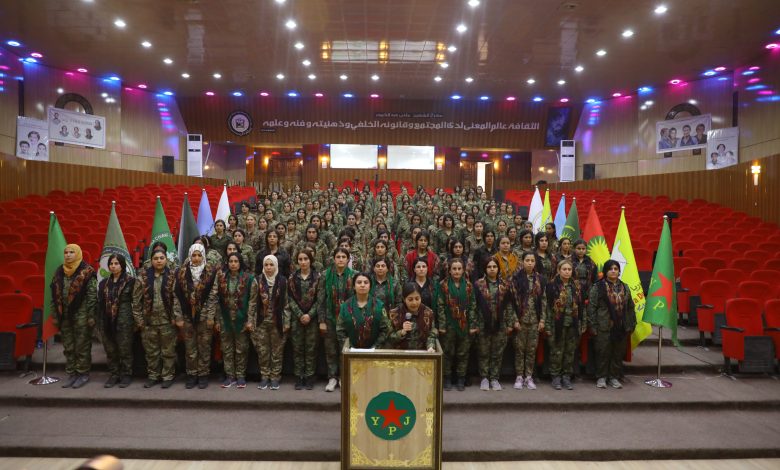
The final declaration of the Second Forum on Women and Protection in the Middle East includes the following:
“At the outset of this concluding statement, and to ensure it remains a luminous beacon for a world filled with greater justice, freedom, peace, and security, we honor the memory of the Butterflies of Freedom—the Mirabal sisters—and our fallen comrades, who sacrificed their lives in the struggle for freedom. Among them are Martyr Nalîn Mûş, Helîn Karê, Şevîn Karzan, Jiyan Tolhildan, Rojna Aqîd, Leyla Aqre, and Arîn Mîrkan. We extend our deepest respect to their noble spirits, remembering them as towering symbols of sacrifice and unyielding determination. These heroines, who offered their lives on the altar of humanity, are not mere fleeting memories in the history of our people and homeland. Their legacy is a guiding light that strengthens our resolve in defending our dignity and freedom as women.
Through this forum, we renew our commitment to the ideology of Leader Abdullah Öcalan, a symbol of free thought and a pioneer of democratic confederalism. His philosophy embodies sincere camaraderie with women and supports their struggle for liberation. We affirm our participation in the campaign for Öcalan’s physical freedom, believing that his liberation represents the freedom of women and the key to peace and dignity for all peoples.
The Second Forum on Women and Protection convened on November 25, 2024, under the slogan “An Organized Woman is a Strong Woman, and a Strong Woman is the Foundation of Self-Protection.”
It took place during an exceptionally critical juncture, amidst highly sensitive regional and international conditions. The Middle East, due to its strategic location and diverse makeup, has become a theater for global competition and a battleground for the Third World War, with all its devastating consequences. This forum brings together distinguished women leaders and representatives of feminist organizations from various regions to discuss the realities of women’s roles and the enormous challenges they endure as a result of the conflicts ravaging the area.
This global conflict, now an all-encompassing international struggle, has caused catastrophic repercussions for women in the Middle East. Women have not only become victims of the most egregious forms of violence but have also been systematically targeted in these brutal wars, culminating in comprehensive genocidal campaigns. For instance:
In Kurdistan’s mountains, the Free Women’s Troops (YJA-STAR) confront the fiercest assaults, including the use of internationally banned chemical weapons.
In northern and eastern Syria, women face systematic eradication by the Turkish fascist state, which not only unleashes the most barbaric military attacks but also seeks to annihilate the cultural and societal essence of Syrian women to dismantle the resilience of the entire populace.
In Palestine and Lebanon, women bear the brunt of catastrophic wars, enduring occupation and oppression while paying a high price.
In Iranian and Turkish prisons, the situation is even more dire, as women are executed or sentenced to life imprisonment simply for raising their voices for freedom under the slogan: “Women – Life – Freedom.”
Women have never been incidental victims of war and conflict; rather, they have been deliberate targets. By terrorizing women, oppressive forces aim to intimidate societies. By breaking women’s will, they break the will of nations, and by undermining women’s dignity, they undermine the dignity of entire communities. Women, as the foundation of strong, cohesive societies, are directly targeted by forces of war to dismantle societal structures and erode collective strength and resolve.
Yet, despite this grim reality, women remain an inexhaustible source of energy. Like the phoenix, they rise from their ashes, resilient against the tides of time. Women refuse to be mere victims at the altar of monstrous tyranny. They embody a perpetual revolution, resilient against adversity, and unyielding in the face of calamities, with no place for surrender in their vocabulary.
The Free Women’s Troops (YJA-STAR), the Women’s Defense Forces in Eastern Kurdistan (HPJ), the Women’s Units of Shengal (YJŞ), the Women’s Protection Units (YPJ), the Beth Nahrain Syriac Forces, the Khabur Assyrian Guard, and the Women’s Civil Defense Forces (HPC-JIN) in northern and eastern Syria have collectively reflected the essence of women’s reality and strength. These military entities stand as exemplary models of women’s resistance, showcasing their determination to protect their identities. These forces have played a pioneering role in building a defensive system rooted in confederal and communal principles, challenging centralized authoritarianism, and paving the way for democratic societal structures.
These entities have demonstrated an unparalleled ability to transform suffering into a force for resolution, turning tragedy into an opportunity for revival. Women, through these organizations, have become pivotal to constructing a new world based on freedom, justice, and equality. They have emerged as symbols of a humanitarian project that transcends traditional authority, fostering societal relations built on solidarity and collective organization.
Amid these existential challenges, this forum underscores that establishing a women’s defense system within the framework of a Women’s Confederation in the Middle East is not merely an option but an urgent moral and humanitarian necessity. This system will serve as a shield to safeguard dreams of social justice, making our shared struggle a launchpad for building a future of peace and humanity where women lead the journey for freedom and dignity.
Key Discussion Points:
- The impact of the Third World War and escalating conflicts on Middle Eastern women and strategies for addressing these challenges.
- The obstacles facing women in protection and defense.
- Policies and measures required to ensure the protection of women.
- Promoting the culture of women’s self-defense as a tool for empowerment.
- Practical strategies for building local and regional defense mechanisms to protect women and guarantee their active leadership in constructing democratic and ecological societies that uphold women’s freedom.
- Strengthening collaboration with feminist movements to create a safe and sustainable environment for women in the Middle East.
Strategic Recommendations:
- Establishing a Women’s Security and Protection Council in northern and eastern Syria.
- Forming a Women’s Security and Protection Council for the Middle East.
- Strengthening integrated national and regional policies to protect women.
- Developing educational programs to equip women with the skills and knowledge needed to defend their identity and to enhance their capacities in politics and diplomacy concerning protection and defense.
- Sharing intellectual and practical experiences in women’s self-defense to counter systematic genocides and sexual violence.
- Building feminist support networks at local and regional levels to encourage women’s engagement in community security and defense.
- Launching training initiatives to empower women in community defense roles and prepare them for leadership in protecting their communities.
- Collaborating with international feminist organizations to establish joint mechanisms offering support and training for women in conflict zones.
- Enhancing regional cooperation to create shared platforms for exchanging expertise and providing practical solutions to women’s protection issues.
- Developing a regional framework to implement the forum’s recommendations and unify policies for safeguarding women and reinforcing their role in peace-building and societal protection.
- Partnering with global human rights organizations and feminist institutions to direct regional efforts toward creating a safe and free environment for women in the Middle East.
Let these recommendations be the agenda of our united struggle on this International Day for the Elimination of Violence Against Women, reminding us all of the urgent need for solidarity and unity in confronting these genocides. We must not be misled by the false promises and hollow commitments of patriarchal systems. Instead, we shall transform every day into a day of resistance under the banner: “With the Philosophy of ‘Woman, Life, Freedom’, We Will Protect Ourselves.”
Women's movements and organisations participating in the Second Forum on Women and Protection in the Middle East reiterated their commitment to continue and strengthen the struggle in the region.

ANF
TABQA
Tuesday, 26 November 2024
The Women’s Protection Units (YPJ) held the Second Forum on Women and Protection in the Middle East under the slogan “An Organized Woman is a Strong Woman, and a Strong Woman is the Foundation of Self-Protection.”
The forum was held in Tabqa on Monday with the participation of 500 delegates, including women's organisations, YPJ fighters and military council members.

The forum at Tabqa Culture and Art Centre started with a moment of silence, followed by a speech by the YPJ General Commander, Sozdar Dêrik, who said, “We will not let any obstacle affect our struggle. This struggle will lead us to victory.”
Sozdar Dêrik drew attention to the importance of women's emancipation and strengthening their self-defence and said, ‘We need to liberate all women so that they can get their rights, be strong and protected. This has been our primary goal from the beginning.”
Dêrik noted that the wars in the Middle East serve the interests of the powers, not the peoples. Describing the conflicts in many countries such as Lebanon, Syria, Palestine and Yemen as ‘wars of genocide’, Sozdar Dêrik emphasised that women's struggle plays a key role in overcoming the destruction caused by these wars.
Stating that the slogan ‘Jin, Jiyan, Azadî’ (Woman, Life, Freedom) has become a philosophy of freedom for women's movements around the world, Sozdar Dêrik noted that this slogan has been banned in Amed tr: Diyarbakır) in Northern Kurdistan and said that the occupying policies in Turkey aim to suppress the women's struggle.

The forum also discussed Kurdish leader Abdullah Öcalan’s evaluations of the role of women in the democratic transformation of the Middle East, which highlighted the historical importance of women in the struggle for social freedom.
A video message sent by the Party of Free Women in Kurdistan (PAJK) and a cinevision show on women's struggle in Northern and Eastern Syria were also screened.

The forum discussed in detail the protection of women, the strengthening of the culture of self-defence and the leading role of women in the construction of a democratic and ecological society. The forum also discussed efforts to develop strategies to build regional defence mechanisms with the goal of providing a safe and sustainable environment for women.
Following the discussions, the forum ended with the reading of messages, theatre performances and songs. Women's movements and organisations participating in the forum reiterated their commitment to continue and strengthen the struggle in the region.

The final declaration of the Second Forum on Women and Protection in the Middle East includes the following:
“At the outset of this concluding statement, and to ensure it remains a luminous beacon for a world filled with greater justice, freedom, peace, and security, we honor the memory of the Butterflies of Freedom—the Mirabal sisters—and our fallen comrades, who sacrificed their lives in the struggle for freedom. Among them are Martyr Nalîn Mûş, Helîn Karê, Şevîn Karzan, Jiyan Tolhildan, Rojna Aqîd, Leyla Aqre, and Arîn Mîrkan. We extend our deepest respect to their noble spirits, remembering them as towering symbols of sacrifice and unyielding determination. These heroines, who offered their lives on the altar of humanity, are not mere fleeting memories in the history of our people and homeland. Their legacy is a guiding light that strengthens our resolve in defending our dignity and freedom as women.
Through this forum, we renew our commitment to the ideology of Leader Abdullah Öcalan, a symbol of free thought and a pioneer of democratic confederalism. His philosophy embodies sincere camaraderie with women and supports their struggle for liberation. We affirm our participation in the campaign for Öcalan’s physical freedom, believing that his liberation represents the freedom of women and the key to peace and dignity for all peoples.
The Second Forum on Women and Protection convened on November 25, 2024, under the slogan “An Organized Woman is a Strong Woman, and a Strong Woman is the Foundation of Self-Protection.”
It took place during an exceptionally critical juncture, amidst highly sensitive regional and international conditions. The Middle East, due to its strategic location and diverse makeup, has become a theater for global competition and a battleground for the Third World War, with all its devastating consequences. This forum brings together distinguished women leaders and representatives of feminist organizations from various regions to discuss the realities of women’s roles and the enormous challenges they endure as a result of the conflicts ravaging the area.
This global conflict, now an all-encompassing international struggle, has caused catastrophic repercussions for women in the Middle East. Women have not only become victims of the most egregious forms of violence but have also been systematically targeted in these brutal wars, culminating in comprehensive genocidal campaigns. For instance:
In Kurdistan’s mountains, the Free Women’s Troops (YJA-STAR) confront the fiercest assaults, including the use of internationally banned chemical weapons.
In northern and eastern Syria, women face systematic eradication by the Turkish fascist state, which not only unleashes the most barbaric military attacks but also seeks to annihilate the cultural and societal essence of Syrian women to dismantle the resilience of the entire populace.
In Palestine and Lebanon, women bear the brunt of catastrophic wars, enduring occupation and oppression while paying a high price.
In Iranian and Turkish prisons, the situation is even more dire, as women are executed or sentenced to life imprisonment simply for raising their voices for freedom under the slogan: “Women – Life – Freedom.”
Women have never been incidental victims of war and conflict; rather, they have been deliberate targets. By terrorizing women, oppressive forces aim to intimidate societies. By breaking women’s will, they break the will of nations, and by undermining women’s dignity, they undermine the dignity of entire communities. Women, as the foundation of strong, cohesive societies, are directly targeted by forces of war to dismantle societal structures and erode collective strength and resolve.
Yet, despite this grim reality, women remain an inexhaustible source of energy. Like the phoenix, they rise from their ashes, resilient against the tides of time. Women refuse to be mere victims at the altar of monstrous tyranny. They embody a perpetual revolution, resilient against adversity, and unyielding in the face of calamities, with no place for surrender in their vocabulary.
The Free Women’s Troops (YJA-STAR), the Women’s Defense Forces in Eastern Kurdistan (HPJ), the Women’s Units of Shengal (YJŞ), the Women’s Protection Units (YPJ), the Beth Nahrain Syriac Forces, the Khabur Assyrian Guard, and the Women’s Civil Defense Forces (HPC-JIN) in northern and eastern Syria have collectively reflected the essence of women’s reality and strength. These military entities stand as exemplary models of women’s resistance, showcasing their determination to protect their identities. These forces have played a pioneering role in building a defensive system rooted in confederal and communal principles, challenging centralized authoritarianism, and paving the way for democratic societal structures.
These entities have demonstrated an unparalleled ability to transform suffering into a force for resolution, turning tragedy into an opportunity for revival. Women, through these organizations, have become pivotal to constructing a new world based on freedom, justice, and equality. They have emerged as symbols of a humanitarian project that transcends traditional authority, fostering societal relations built on solidarity and collective organization.
Amid these existential challenges, this forum underscores that establishing a women’s defense system within the framework of a Women’s Confederation in the Middle East is not merely an option but an urgent moral and humanitarian necessity. This system will serve as a shield to safeguard dreams of social justice, making our shared struggle a launchpad for building a future of peace and humanity where women lead the journey for freedom and dignity.
Key Discussion Points:
- The impact of the Third World War and escalating conflicts on Middle Eastern women and strategies for addressing these challenges.
- The obstacles facing women in protection and defense.
- Policies and measures required to ensure the protection of women.
- Promoting the culture of women’s self-defense as a tool for empowerment.
- Practical strategies for building local and regional defense mechanisms to protect women and guarantee their active leadership in constructing democratic and ecological societies that uphold women’s freedom.
- Strengthening collaboration with feminist movements to create a safe and sustainable environment for women in the Middle East.
Strategic Recommendations:
- Establishing a Women’s Security and Protection Council in northern and eastern Syria.
- Forming a Women’s Security and Protection Council for the Middle East.
- Strengthening integrated national and regional policies to protect women.
- Developing educational programs to equip women with the skills and knowledge needed to defend their identity and to enhance their capacities in politics and diplomacy concerning protection and defense.
- Sharing intellectual and practical experiences in women’s self-defense to counter systematic genocides and sexual violence.
- Building feminist support networks at local and regional levels to encourage women’s engagement in community security and defense.
- Launching training initiatives to empower women in community defense roles and prepare them for leadership in protecting their communities.
- Collaborating with international feminist organizations to establish joint mechanisms offering support and training for women in conflict zones.
- Enhancing regional cooperation to create shared platforms for exchanging expertise and providing practical solutions to women’s protection issues.
- Developing a regional framework to implement the forum’s recommendations and unify policies for safeguarding women and reinforcing their role in peace-building and societal protection.
- Partnering with global human rights organizations and feminist institutions to direct regional efforts toward creating a safe and free environment for women in the Middle East.
Let these recommendations be the agenda of our united struggle on this International Day for the Elimination of Violence Against Women, reminding us all of the urgent need for solidarity and unity in confronting these genocides. We must not be misled by the false promises and hollow commitments of patriarchal systems. Instead, we shall transform every day into a day of resistance under the banner: “With the Philosophy of ‘Woman, Life, Freedom’, We Will Protect Ourselves.”

No comments:
Post a Comment